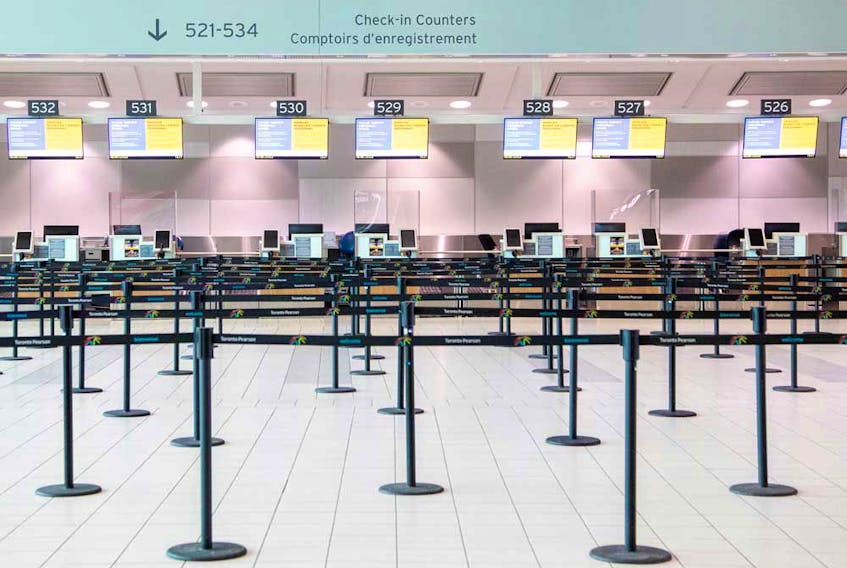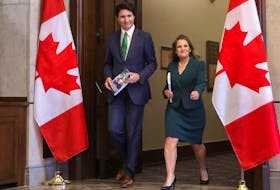Shares of Air Canada soared more than 28 per cent on Monday after the release of promising results for a vaccine against COVID-19, but industry watchers warn the struggling airline sector is still a long way from returning to normal and that the vaccine developments are unlikely to impact a relief package being hammered out with government.
“I don’t really think it changes the calculus,” airline consultant Robert Kokonis said in an interview, noting that even if Pfizer Inc. and partner BioNTech get full regulatory and government approval for their candidate vaccine, it is not expected to be widely available until at least next fall.
Recovery to pre-pandemic levels was already expected to take four or five years even with a vaccine, Kokonis said. Recovery to 2019 levels had been pushed out further from initial targets after a summer season that Statistics Canada called the “industry’s worst ever” in a report last month.
Air passenger traffic plummeted nearly 90 per cent in the June to August period from the summer of 2019.
“The industry is going to come back certainly smaller than it was,” said Kokonis, founder and managing director of AirTrav. “I don’t think today’s announcement (that the vaccine was more than 90 per cent effective in early testing) changes that expectation.”
Catherine Deluz, a senior vice-president at Moody’s Investors Service, called the Pfizer announcement “good news” for the aviation industry. But she said production and the logistics of vaccinating enough of the population to make a difference would take time.
“This is not an immediate solution,” she said, adding that “air traffic is going to be depressed still for some time.”
Kokonis said Air Canada’s swing from profit to loss in its traditionally strongest quarter illustrates the need for airlines to look at more immediate measures to get people back on planes.
Canada’s largest airline on Monday reported a loss of $685 million compared to a profit of $636 million in the third quarter a year earlier — a swing, he noted, of more than $1 billion.
“There are people who will never fly until there’s a vaccine,” Kokonis acknowledged. But he said many others would if there was more widespread and consistent virus testing and checks in the travel and aviation sector. This could lead to fewer quarantine requirements and facilitate travel to more destinations, he said, noting that Canadians were removed from the European Union’s permissible travel list last month because of growing COVID-19 cases.
“There are a lot of people who want (to travel for business or pleasure) but can’t,” he said, adding that measures facilitating an increase to even 50 per cent of passenger capacity would go a long way to the industry righting itself financially.
Negotiating with the federal government to pay for and coordinate this testing — and to push Health Canada for approval of more rapid testing technology — is at least as important to the industry as securing low-cost loans that would help airlines cover fixed costs they are on the hook for even if people aren’t flying, Kokonis said.
As the airline industry enters talks with the federal government this week over the terms of a relief package, an organization representing large airlines including Air Canada and WestJet indicated that a national testing strategy will be critical to re-starting the industry.
“As this work gets underway, the industry will continue its ongoing efforts to establish COVID-19 testing programs in conjunction with our airport partners, and establish a coordinated testing strategy with the federal government,” said Mike McNaney, chief executive of the National Airlines Council of Canada.
Deluz, the Moody’s analyst, said a rapid testing regime “would be a positive development but not enough by itself to sustain a strong recovery” for the aviation industry.
“Rapid testing will help but (there are) still concerns and logistics to finalize and answers to be obtained for travellers to feel confident enough,” she said.
Kokonis said the crisis and current negotiations should force the government to re-think the “user pay” model that sustains key parts of the aviation sector including airports and Nav Canada, the country’s air navigation service provider.
With fewer passengers on flights, reliance on revenue driven by volume rather than cost-recovery is causing financial pain, he said. And while relief for airlines will help, it won’t be enough.
While initial talks appear to be between Ottawa and the airlines, an association representing airport authorities across the country is pushing for government aid in the form of interest-free loans or direct operational support, rent relief and a new stream of funds for safety and security at airports that don’t qualify for existing capital assistance programs.
“The crisis has lasted longer than expected, with massive financial challenges for airports,” Daniel-Robert Gooch, president of the Canadian Airports Council, said Sunday.
Shares of Air Canada closed up $4.53 at $20.35 in Toronto Monday.
• Email: [email protected] | Twitter: VicF77
Copyright Postmedia Network Inc., 2020








